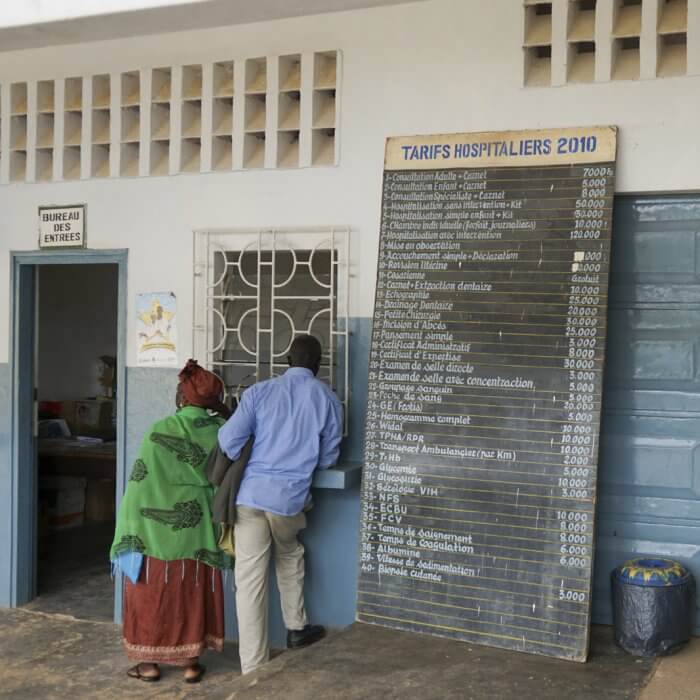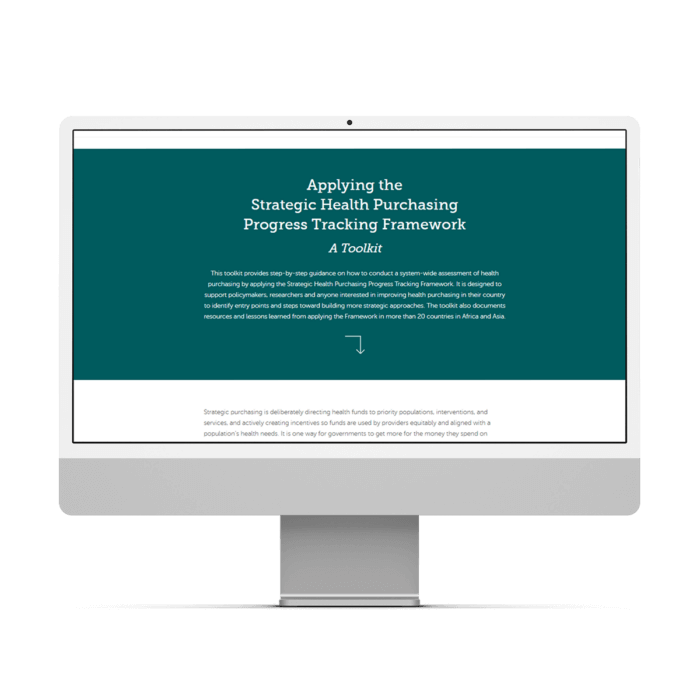Results for Development (R4D) supports government officials to spend limited health and nutrition funds better to achieve more, and progress toward universal health coverage.
The Challenge
Around the world, demand for public health services and care is high and leaders must allocate limited funds effectively to improve population health and achieve universal health coverage (UHC). This is even more critical in low- and middle-income countries where resources are severely constrained. This can be done by directing funds to priority populations, interventions and services, or by creating incentives for health care providers to provide high-quality care in a cost-effective manner.
Government agencies and health insurance funds can become strategic purchasers and wield considerable influence by using evidence to deliberately choose what services to buy, and from which providers. Their decisions have a wide impact on service delivery, enabling them to promote efficiency and quality.
However, if they adopt a passive purchasing model — where they do not actively manage the allocation of resources to incentivize quality, cost-effectiveness and equity — resources often flow to high-cost services and wealthy, urban areas. This can exacerbate health disparities across populations.
Our Approach
R4D is supporting governments to adopt a more strategic approach when it comes to their purchasing power. Strategic purchasing is about making informed decisions about which services or products to buy, from whom and for how much. This approach helps countries improve the quality of care and services they provide — and ensure more people have access to services — with limited funds.
R4D’s approach to strategic purchasing centers on support to local change agents and stakeholders who have purchasing power (or influence on purchasing power) in multiple ways. This includes:
- Supporting country-led change processes that identify and address key challenges
- Providing tools to guide system-wide assessments and identify entry points to improve purchasing
- Connecting change agents to coaches with similar backgrounds to share valuable experience and guidance
- Facilitating Collaborative Learning Networks among change agents from different countries facing similar challenges, to support peer-to-peer learning, produce global knowledge products, conduct context-specific analyses, and provide on-demand support in the implementation of strategic purchasing initiatives.
Our approach supports local leaders with knowledge and skills to implement strategic purchasing, while also strengthening capacity and systems to continue making purchasing more strategic over time.
R4D’s Work
R4D has supported more than 20 countries in their efforts to implement strategic purchasing. We work collaboratively alongside stakeholders at the national and local levels to ensure that research and subsequent changes are country-driven. We also connect global and regional strategic purchasing experts with country stakeholders for coaching, mentoring and generating evidence-based knowledge products.
- R4D incubated and launched the Strategic Purchasing Africa Resource Center (SPARC) — a regional platform that connects experts to one another to share real-time implementation experience and learning as well as peer support across sub-Saharan Africa. R4D recruited a consortium of 11 Anglophone and Francophone Africa-based academic and policy analysis institutions to support their governments and drive the strategic health purchasing agenda on the continent. Now, these institutions have become the go-to experts to deliver technical support to government agencies across Africa in strategic purchasing. Together, the institutions produced and launched (in a special issue of The Health Systems and Reform (HSR) journal) the largest body of strategic purchasing research from the African continent, which included 17 papers — in the form of commentaries, policy reports and articles — by 43 experts (41 of whom are from African academic institutions, think tanks, and policy agencies). The consortium also co-created the Strategic Health Purchasing Progress Tracking Framework which has been applied in more than 20 countries across Africa and Southeast Asia to assess current purchasing arrangements and identify areas for improvement. More recently, SPARC developed a toolkit to provide step-by-step guidance on applying the Framework. The toolkit also documents resources and lessons learned from others who have applied the Framework in their countries.
- R4D, with funding from the Bill & Melinda Gates Foundation, is supporting Nigeria’s Federal Ministry of Health, National Public Health Development Agency, and National Health Insurance Agency (NHIA) to implement health financing policies at the federal and state level. For example, R4D supports coordination between federal government agencies on prioritizing health in the national budget and provides technical assistance to align the Federal Ministry of Health’s budget process with its strategic priorities.
- Through the NHIA Leadership Development Programme (NLDP), R4D enhanced the strategic, managerial and technical skills of senior and middle management at NHIA. SPARC was also invited to support capacity building on strategic health purchasing within the NHIA team through the facilitation of core modules developed by SPARC. SPARC also leveraged its network of strategic purchasing experts to share knowledge with the NLDP cohort through coaches and mentors.
- Since 2011, R4D has led the Provider Payment Technical Initiative of the Joint Learning Network for Universal Health Coverage. Through this platform, R4D and practitioners from more than 20 countries have co-created new knowledge, guidance and toolkits on costing of health services for provider payment, assessing provider payment systems and provider payment monitoring. Country experiences have been captured in briefs, podcasts and videos.
- R4D and the World Health Organization (WHO) developed a diagnostic approach to help governments and other stakeholders assess and improve strategic health purchasing for primary health care (PHC) and to increase understanding of how nutrition can fit into broader PHC purchasing arrangements. The approach builds on the Strategic Purchasing Progress Tracking Framework developed by SPARC and a WHO publication which provides an overview of strategic purchasing of nutrition services within PHC. The new diagnostic approach includes 4 steps and 28 questions to guide stakeholders through their journey of becoming more strategic in purchasing nutrition services.
- R4D collaborated with the London School of Hygiene and Tropical Medicine (LSHTM) to co-author five policy briefs for the Ethiopian government to improve strategic purchasing. This was in response to a request from the Ethiopian Ministry of Health (MOH) and Ethiopian Health Insurance Services (EHIS) for an evidence review and synthesis on four priority topics.
- R4D supported Ghana’s National Health Insurance Agency’s (NHIA) transition to a more strategic and evidence-based health purchaser to promote financial sustainability of the scheme under the USAID’s five-year Health Finance and Governance (HFG) Project. R4D supported the NHIA to put in place routine tools to better manage and align provider payment systems, including the institutionalization of routine provider mapping to track provider capacity to deliver essential services, an early warning system to manage provider responses to the incentives of capitation, and a Training of Trainers program to build capacity on how capitation works. R4D also helped the NHIA build capacity to generate and use data for effective health purchasing by co-developing data dashboards that track key performance indicators for managerial action and feature real time access to data.
- R4D — through the USAID Health Financing Activity (HFA) — supported the government of Indonesia to improve strategic health purchasing by piloting new purchasing arrangements focused on Tuberculosis, Maternal Newborn Health (MNH), and HIV. R4D worked in collaboration with multi-stakeholder technical working groups and the Indonesian Ministry of Health Center for Health Financing and Insurance to assess service delivery challenges and design the pilot programs. R4D also created and maintained monitoring systems for these pilots, ensuring evidence was gathered to inform the full-scale programs. The MNH pilot program expanded the package of health services provided by the Ministry of Health, which diversified health services for mothers and their newborns and also proactively monitored the risk of pregnancy complications. In addition to improving the quality of care in facilities, those facilities participating in the pilot were better equipped to ensure a successful roll-out of the new package thanks to the pilot’s focus on capacity-building.
- As a partner on the USAID-funded Health Financing and Governance (HFG) project, R4D led an assessment of strategic purchasing in Indonesia in collaboration with the Gadjah Mada University in Indonesia. The assessment revealed gaps in the responsibility of purchasing functions. For example, although a new purchasing agency, the BPJS-K had been established to implement the national health insurance system, many purchasing functions were retained by the Ministry of Health. Other knowledge products developed under HFG include a technical brief on Unleashing the Potential of Strategic Purchasing and a report on Strategic Health Purchasing Progress: A Framework for Policymakers and Policymakers.
- In 2022, R4D published an article “How to become a strategic purchaser of rehabilitation services” in the Bulletin of the World Health Organization outlining how policymakers in middle-income countries can leverage strategic purchasing to improve rehabilitation services outcomes — and promote the integration of rehabilitation services into health systems. The article examines three policy priorities health planners should adopt to implement more strategic purchasing of rehabilitation and analyzes their associated processes, actors and resources based on country experiences: evidence-based benefits packages, provider payment mechanisms, and stewardship for purchasing.
- R4D collaborated with World Health Organization to develop a guide on Aligning the public financial management system with the health financing system. This document offers guidance to help health and finance authorities engage in productive dialogue, assess alignment between a country’s public financial management (PFM) system and health financing system, and work toward a joint policy roadmap to improve alignment. This is critical to ensure sustainable progress toward Universal Health Coverage since a country’s public health financing system must routinely generate sufficient, and largely domestic, resources to achieve health sector objectives within its macroeconomic and fiscal context.
- R4D produced and launched an immunization financing resource guide to help advocates, policymakers and program managers increase access to and funding for vaccines. The guide includes 26 briefs, with eight country case studies, and is intended for both Gavi and non-Gavi eligible countries to assess different financing options, approaches to strategic purchasing and strategies for policy change.
















